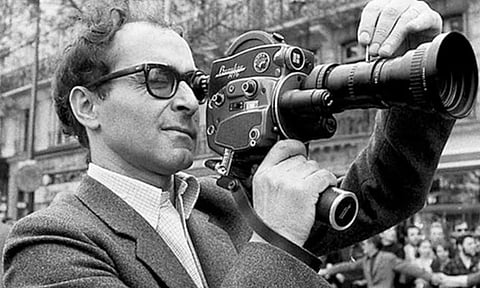

How does one begin to speak about Jean-Luc Godard, the French-Swiss filmmaker who chose to end his life on Wednesday at the age of 91? More precisely, which Godard does one speak of? The renegade critic at the iconic film magazine Cahiers du cinéma who championed directors working at the lower depths of the Hollywood studio system? The young independent filmmaker who inspired, and continues to inspire, generations of movie brats with an astounding series of insouciant, dynamic, and self-aware works, starting with Breathless (1960)? The angry Maoist who quit filmmaking in the late sixties to work in anonymity within various political collectives, most notably the Dziga Vertov Group? The melancholy recluse who, alongside his partner and filmmaker Anne-Marie Miéville, experimented with video and made one of the greatest cinematic works of all time, Histoire(s) du Cinéma (1988-1998)? Or the Old Master who continued to shake up the film form in the first two decades of our century, with a series of mournful, caustic digital essays?
If Godard has taught us anything, it is that we can begin anywhere. Beginning anew, restarting at zero, is a theme that has characterised Godard’s professional life. His films from the 1990s onwards are shot through with a lament about the premature death of cinema, the snuffing out of its possibilities by commerce and art.
Yet, Godard was never a purist, and he embraced most every technological development — lightweight handheld cameras, television, analogue and digital videos, 3D stereoscopy, smartphones and even Instagram — at a time that these were seen as inimical to cinematic practice. Godard’s body of work is defined by such ruptures and recommencements, so much so that they become its defining elements.
It may be odd to talk about the body of work of a filmmaker who hated careerism and couldn’t perhaps be bothered less about his legacy; he was, after all, working on new films at the time of his death by assisted suicide. Yet as a colossus of twentieth-century art, he casts a tall shadow. Godard’s legacy would be secure even if he hadn’t made a single film; his passionate, typically epigrammatic film criticism, published in English as the book Godard on Godard (1986), has countless imitators, but few equals.
Filmmaking, he famously remarked, is criticism by other means. His reflexive and densely allusive films are shining instances on the medium’s capacity to reflect not just on itself, but on its relation to history and the world. In Breathless, a celebrity writer is asked by the journalist-heroine what his ambition is. He replies, “To become immortal, and then to die.” Has Godard achieved that? As a lifelong contrarian and a master of cryptic aphorisms, Godard would have no doubt had a zinger in response.
(The writer is a Bengaluru-based film critic)